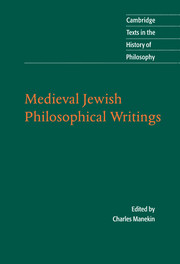Book contents
- Frontmatter
- Contents
- Introduction
- Chronology
- Further reading
- Note on the texts and translations
- 1 Saadia Gaon, from The Book of the Beliefs and Convictions
- 2 Solomon ibn Gabirol and Shem Tov b. Joseph Falaquera, Excerpts from “The Source of Life”
- 3 Moses Maimonides, from The Guide of the Perplexed
- 4 Isaac Albalag, from The Emendation of the “Opinions”
- 5 Moses of Narbonne (Narboni), The Treatise on Choice
- 6 Levi Gersonides, from The Wars of the Lord
- 7 Ḥasdai Crescas, from The Light of the Lord Treatise Two
- 8 Joseph Albo, from The Book of Principles
- Index
- CAMBRIDGE TEXTS IN THE HISTORY OF PHILOSOPHY
7 - Ḥasdai Crescas, from The Light of the Lord Treatise Two
Published online by Cambridge University Press: 05 June 2012
- Frontmatter
- Contents
- Introduction
- Chronology
- Further reading
- Note on the texts and translations
- 1 Saadia Gaon, from The Book of the Beliefs and Convictions
- 2 Solomon ibn Gabirol and Shem Tov b. Joseph Falaquera, Excerpts from “The Source of Life”
- 3 Moses Maimonides, from The Guide of the Perplexed
- 4 Isaac Albalag, from The Emendation of the “Opinions”
- 5 Moses of Narbonne (Narboni), The Treatise on Choice
- 6 Levi Gersonides, from The Wars of the Lord
- 7 Ḥasdai Crescas, from The Light of the Lord Treatise Two
- 8 Joseph Albo, from The Book of Principles
- Index
- CAMBRIDGE TEXTS IN THE HISTORY OF PHILOSOPHY
Summary
On the cornerstones of the Torah, i.e., the foundations and pillars upon which the House of God is established. Through their existence, the existence of a Law ordered from God (may He be blessed) is conceivable; whereas if one of them is lacking, the entire Law falls, God forbid.
Upon investigation, we find there to be six cornerstones of the Torah: First, God's knowledge of existents; second, His providence for them; third, His ability; fourth prophecy; fifth, choice; sixth, the final end [of the Law].
There are six, for since the Law is a voluntary act from a commander, i.e., the agent, to one commanded, i.e., the patient, it follows of necessity that the agent is knowing, willing, and able, and that the patient is willing and choosing, not compelled or coerced. And since an act from the agent to the patient cannot fail to establish some relation between them, it follows that there will be a relation and certain conjunction between them, namely, prophecy. And since every act aims towards an end, whether that act be natural or artificial, or, certainly, voluntary and from an infinitely perfect agent, this perfect act cannot fail to be for an important end. For this reason we have seen fit to divide this treatise into six principles.
- Type
- Chapter
- Information
- Medieval Jewish Philosophical Writings , pp. 192 - 235Publisher: Cambridge University PressPrint publication year: 2008

